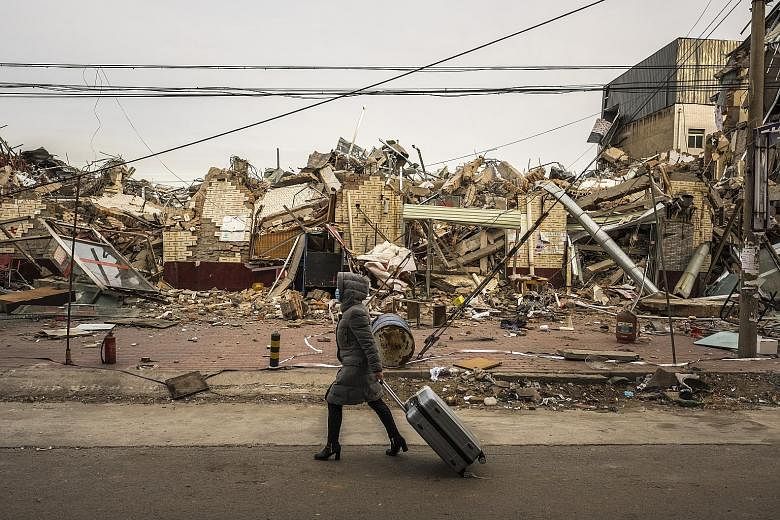BEIJING • At night on the edges of Beijing, the migrant workers who keep China's capital city fed, cleaned, swept and supplied wait in fear of a knock on the door that could ruin their hopes of finding a better life.
Far from the skyscrapers and monuments downtown, squads of police and safety inspectors have been scouring the city's sprawling outer neighbourhoods crowded with labourers from poor rural China.
Those living or working in buildings deemed to be dangerous or illegal are ordered to vacate, sometimes with just a few hours' notice, before homes, shops and even whole factories are demolished.
Tens of thousands have already been uprooted in the city's most aggressive drive against migrant neighbourhoods that people can recall; many more migrants are wondering how much longer they can remain in their homes, or even in Beijing.
The Beijing government has said the clearances were urgently justified by a fire in a migrant worker apartment in Xinjian village that killed 19 people, including 17 from other parts of China.
After that, officials hastily listed 25,395 safety hazards across the city. The party secretary of Beijing, Mr Cai Qi, ordered a 40-day clearance campaign to rid the city of safety hazards in migrant neighbourhoods.
But many migrants say the government is using the fire as an excuse to ramp up efforts to drive them out and ease pressures in a city whose population has already soared beyond 20 million people.
"Suddenly, in one night, my livelihood was destroyed, as if I'd been attacked by bandits, but this was done by the government saying they care for us," said Ms Zhang Guixin, a 38-year-old woman from the central Chinese province of Henan, whose fruit and vegetable stall was demolished.
"I've never seen anything like this in eight years in Beijing - nothing," she said, standing beside the remnants of her stall in Xinjian Village, a migrant neighbourhood in southern Beijing where the clearance has so far been most intense.
The expulsions have been in jarring contrast to the vision that Chinese President Xi Jinping laid out in October when he won a second term as Communist Party leader and vowed to build a prosperous society of equals.
The drive against the settlements has left migrants abruptly homeless in mid-winter and asking why leaders of the party founded to represent the poor labouring masses have turned so harshly on them.
Migrant Dang Hui'e from the north-western province of Shaanxi, where Mr Xi spent part of his youth, said she was ordered to move out of her apartment with three days' notice while caring for her nine-month-old baby.
"The law is laid down by you, you're the President, so what's the good of the laws that you lay down?" she asked.
Xinjian Village was teeming with migrant workers and their children until two weeks ago.
Now, half the area is a field of rubble and debris from demolished buildings, and the other half is nearly empty and waiting for the wrecking crews. Remaining inhabitants packed their belongings into suitcases and boxes.
A similar scene is being played out in dozens of migrant neighbourhoods across the city.
Migrants said they felt as if they were being treated as pests by Beijing, which already excludes them from the education, healthcare and housing benefits provided to locals with permanent resident permits.
"We're all Chinese, this is our capital too, the people's capital," said cleaner Shi Yongxiang, who is from north-west China. "How can Beijing get by without migrant workers? We do every job that the locals won't do."
Initially, city leaders ignored the complaints from the displaced migrants. But as images of expelled workers dragging their belongings along streets on freezing winter nights appeared on social media, they ignited an unusually strong public backlash.
Even some state-run news outlets have chimed in to criticise the rushed demolitions.
"They are people of flesh and blood, the grassroots labourers who keep Beijing, this huge city, running normally, and they deserve the respect and understanding of every one of us," said a commentary on the website of China's main state broadcaster CCTV.
NYTIMES

